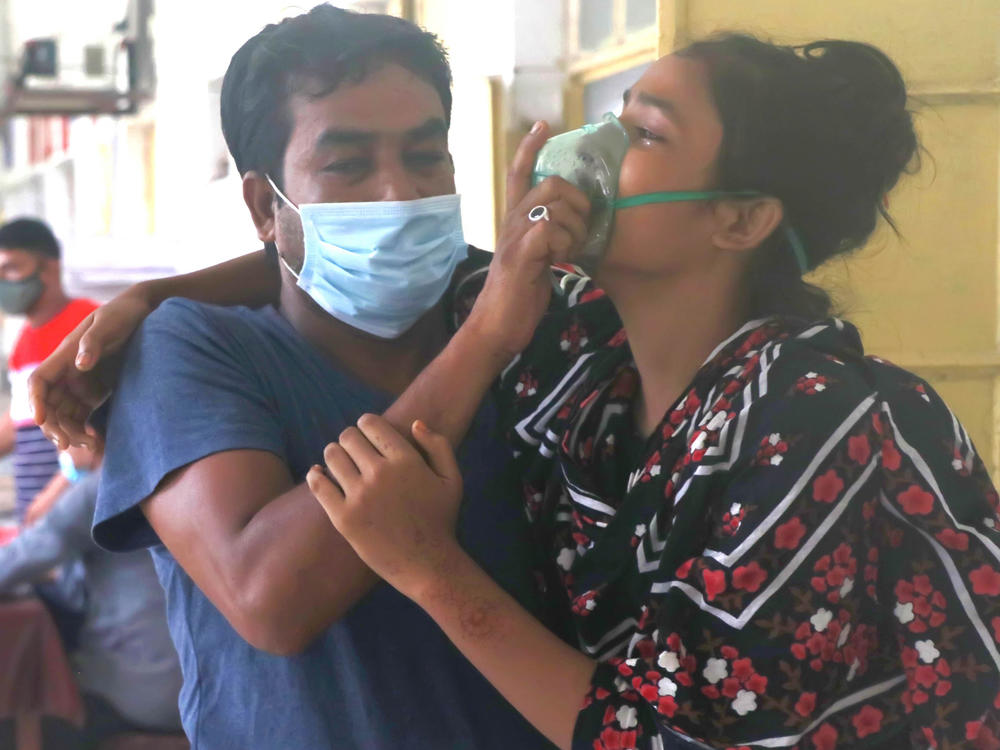Section Branding
Header Content
Bangladesh Locks Down As Daily COVID Cases Quintuple
Primary Content
The coronavirus has silenced even Dhaka's cacophony.
The notoriously traffic-clogged streets of Bangladesh's capital were eerily empty Thursday, save for soldiers on patrol on the first day of a national lockdown imposed after daily tallies of new coronavirus infections nearly quintupled over the past month.
Fueled by the delta variant first detected in neighboring India, this is Bangladesh's third COVID-19 wave. It has hit fast on the heels of a springtime second wave, and during a shortage in vaccine doses. In some poorer countries with low vaccination rates, like Bangladesh, coronavirus cases are surging, even as Western nations open up.
"There will be a fourth wave, and there will be a fifth wave, before we can vaccinate everyone — while rich countries are lifting lockdowns and even giving people booster doses," says Senjuti Saha, a Dhaka-based microbiologist and public health activist at the Child Health Research Foundation. She herself has been unable to get vaccinated, despite being classified as an essential health worker. "We will be stuck in this vicious cycle — more infections, more mutations, more variants — and we are scared."
Less than 3% of Bangladeshis are fully vaccinated.
On Thursday, troops in camouflage and surgical masks set up barricades in Dhaka and used megaphones to order residents into their homes for at least seven days.
Nationwide, private offices, shopping malls, cinemas and markets are closed. Public transit is halted, and gatherings banned. Police warned that anyone caught violating the stay-at-home order — except for essential trips to access food or medicine — would be arrested. Local media reported more than 70 arrests by midday Thursday.
Only essential industries — including Bangladesh's textile factories, which have been an engine of its economy — are allowed to stay open, with social-distancing and temperature checks for workers.
On Thursday, the government confirmed 8,822 new coronavirus infections — a nearly fivefold increase from 1,765 cases on June 1. Deaths attributed to COVID-19 have nearly tripled over the same period. Wednesday's single-day death toll — 115 — was one of Bangladesh's highest since the pandemic began.
That brings the total figures to 14,646 deaths and 921,559 confirmed cases since the start of Bangladesh's outbreak, according to the country's health services.
"As scientists who are constantly monitoring the situation, we are freaked out. Because in March and April, we went through our second wave, after which we thought we would be safe [from another wave] for some time," microbiologist Saha says. "But cases are now rising very quickly, and in the general population, we see some fatigue. For how much longer can this continue?"
Hospitals along the border with India are overcrowded, and some are running short of medical oxygen. In recent days, bus and ferry terminals were teeming with people fleeing the capital before restrictions took effect. Many were migrant laborers left without work.
"It's better to starve with my family in the village," one laborer, Mohammad Masum, told the Agence France-Presse.
The World Health Organization says just over 10 million vaccine doses have been administered in Bangladesh. But most of those are first doses, in a population of more than 160 million.
The shortages are in part because Bangladesh is awaiting the delivery of vaccines manufactured in neighboring India — which halted exports this spring, amid its own COVID-19 outbreak.
On Tuesday, Prime Minister Sheikh Hasina told parliament the country's vaccination drive would accelerate "on a massive scale" in July, bolstered by fresh supplies from China and Russia.
The White House confirmed the U.S. is sending Bangladesh 2.5 million doses of the Moderna vaccine, which are expected to arrive in Dhaka this week. The United States Agency for International Development also said Tuesday that it had delivered nearly $3 million worth of medical supplies to Bangladesh, including oxygen and laboratory equipment to expand coronavirus testing. Bangladesh has also received doses through COVAX, an international WHO-backed program to provide vaccines to countries in need.
Copyright 2021 NPR. To see more, visit https://www.npr.org.

